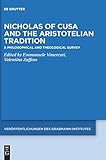Nicholas of Cusa and the Aristotelian Tradition : A Philosophical and Theological Survey / ed. by Emmanuele Vimercati, Valentina Zaffino.
Material type: TextSeries: Veröffentlichungen des Grabmann-Institutes zur Erforschung der mittelalterlichen Theologie und Philosophie : Münchener Universitätsschriften / Katholisch-Theologische Fakultät ; 64Publisher: Berlin ; Boston : De Gruyter, [2020]Copyright date: ©2020Description: 1 online resource (VI, 242 p.)Content type:
TextSeries: Veröffentlichungen des Grabmann-Institutes zur Erforschung der mittelalterlichen Theologie und Philosophie : Münchener Universitätsschriften / Katholisch-Theologische Fakultät ; 64Publisher: Berlin ; Boston : De Gruyter, [2020]Copyright date: ©2020Description: 1 online resource (VI, 242 p.)Content type: - 9783110624908
- 9783110628159
- 9783110630060
- 230
- B765.N54
- online - DeGruyter
- Issued also in print.
| Item type | Current library | Call number | URL | Status | Notes | Barcode | |
|---|---|---|---|---|---|---|---|
 eBook
eBook
|
Biblioteca "Angelicum" Pont. Univ. S.Tommaso d'Aquino Nuvola online | online - DeGruyter (Browse shelf(Opens below)) | Online access | Not for loan (Accesso limitato) | Accesso per gli utenti autorizzati / Access for authorized users | (dgr)9783110630060 |
Frontmatter -- Contents -- Introduction -- A Sketch of the Aristotelian Tradition in Cusanus’ Time -- With Aristotle, Beyond Aristotle -- “… to reject Aristotle and to leap higher.” -- Aristotelische Naturphilosophie als Quelle und Medium der Explikation der cusanischen Lehre vom Unendlichen und der Koinzidenz der Gegensätze -- Strategien des Umgangs mit aristotelischen Positionen in Cusanus’ Idiota de mente -- Cusanus on Ideas and Aristotelianism -- Nicholas of Cusa and the Aristotelian Theory of Substance -- Act and Potency in Cusanus’ Later Thought -- „Bene et feliciter subsistere“ -- Was ist eine gerechte Herrschaft? -- (Anti‐)Aristotelianism in Cusanus’ Sermons -- Index of Proper Names -- Index of Passages -- Notes on Contributors
restricted access online access with authorization star
http://purl.org/coar/access_right/c_16ec
The volume focuses on the relation between Cusanus and Aristotle or the Aristotelian tradition. In recent years the attention on this topic has partially increased, but overall the scholarship results are still partial or provisional. The book thus aims at verifying more systematically how Aristotle and Aristotelianism have been received by Cusanus, in both their philosophical and theological implications, and how he approached the Aristotelian thought. In order to answer these questions, the papers are structured according to the traditional Aristotelian sciences and their reflection on Cusanus' thought. This allows to achieve some aspects of interest and originality: 1) the book provides a general, but systematic analysis of Aristotle's reception in Cusanus' thought, with some coherent results. 2) Also, it explores how a philosopher and theologian traditionally regarded as Neoplatonist approached Aristotle and his tradition (including Thomas Aquinas), what he accepted of it, what he rejected, and what he tried to overcome. 3) Finally, the volume verifies the attitude of a relevant Christian philosopher and theologian of the Humanistic age towards Aristotle.
Issued also in print.
Mode of access: Internet via World Wide Web.
In English.
Description based on online resource; title from PDF title page (publisher's Web site, viewed 28. Feb 2023)


